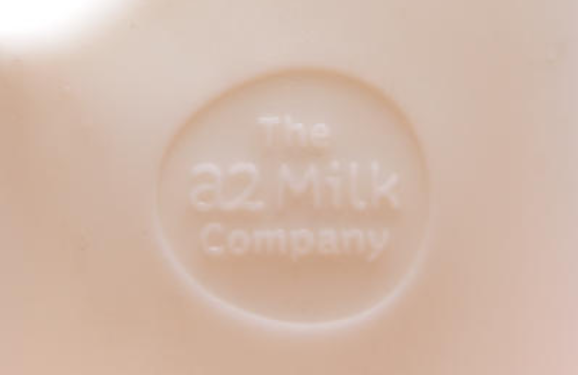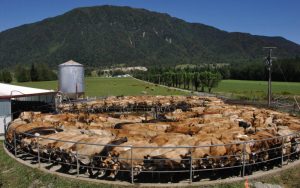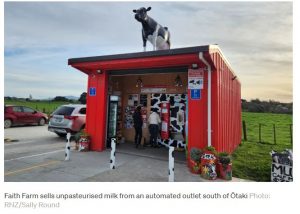
This week the New Zealand company released its financial results for the year to June 30, with the dairy manufacturer posting more than $1234.2 million in revenue thanks to flourishing sales in Asia and the U.S.
In Australia, A2 continues to boost its revenue and market share of the milk business, with revenue up 10.7 percent and market share of more than 11 percent.
However, the jury is still out about what exactly the product offers — given it’s around double the price of regular milk. Some experts say its catch cry ‘feel the difference’ is based on limited evidence, while others point to recent research out of China.
What’s The Difference Between A1 And A2?
A1 and A2 are proteins found specifically in cow’s milk, though in different proportions depending on the breed of cattle.
There are two genetic variants of beta-casein, which is a primary protein in milk. The older variant is A2 and a newer variant in Western cattle is A1.
A1 and A2 each have 209 amino acids and differ by only one — the key disparity is a difference in the 67th amino acid in the chain.
There is some research that suggests the A1 variant may cause gut symptoms in some individuals, although it is unclear how many individuals this impacts or under what circumstances this may occur.
On its website, the manufacturers of A2 say “research shows that A1 and A2 are digested differently. Many people from all over the world tell us they feel the difference when they drink A2 Milk.”
What Does The Evidence Say?
Nutritionally A2 milk is very similar in terms of protein, calcium, fats and vitamins to standard milk, and also comes in a full fat and light option.
In the early 2000s (not long after the A2 corporation formed) there were marketing claims that A1 proteins were harmful to human health. However, over several years these claims were disproved.
“A lot of people are turning to A2 because of the marketing around tolerability and better digestive health,” University of Sydney researcher and founder of Interval Weight Loss Dr Nick Fuller told 10 daily.
“When you actually look at the science and the research you are not getting any improvements in digestion from having the A2 milk,” he said.
In 2002, the A2 Corporation launched a High Court lawsuit against a major New Zealand milk cooperative, accusing it of covering up the possible harmful effects of A1 milk. This was not upheld;
The Corporation also petitioned the Food Standards Australia New Zealand (FSANZ) regulatory authority to have health warnings added to all packaging of all A1 milk products;
In 2005, independent Australian researcher Stewart Truswell carried out an investigation into the health implications of the A1 and A2 proteins. He concluded that there is “no convincing or probable evidence” that the A1 protein in cows’ milk is causing type 1 diabetes or heart disease. Trusewell said links to autism and schizophrenia “is more speculative” and “more unsubstantial”;
In 2009, the European Food Safety Authority published a comprehensive 107-page scientific review supporting Truswell’s conclusions.
A2 milk is heavily promoted as an alternative for people who experience gut discomfort, and early research was based on small samples.
The first peer-reviewed human study was conducted with 41 people;
Another study had 45 subjects and more than half were diagnosed as lactose-intolerant;
Both results showed A2 milk did not cause an increase in unpleasant digestive symptoms;
However, a 2017 study conducted by Chinese academics involving 600 adult Chinese participants with self-reported lactose intolerance reported that consumption of A2 milk reduced gastrointestinal symptoms compared to consuming conventional milk;
Another Chinese trial with 80 pre-school-age children released this year compared ordinary milk with A2 milk, where all children were showing early signs of intolerance to regular milk. It found that normal milk had effects on both digestion and cognitive performance.
But Fuller says the “science doesn’t stack up” and comparing A2 milk to regular milk skews the results.
“You need to be stacking it up against a lactose-free alternative or a dairy alternative like soy but we don’t have that research,” he said.
According to research by Roy Morgan, the number of adult Australians who reported being lactose-intolerant in 2015 was roughly four percent of the overall population.
“It is just clever marketing and you are probably going to react to cows milk [if you are lactose intolerant], but there are cheaper alternatives,” he said.
“A2 comes at double the price point, these people will get the same benefits from lactose-free milk. But if you can and don’t mind paying extra, that is fine.”
However, retired New Zealand academic and author of Devil In The Milk Keith Woodford says the most recent research being published in the Journal of Pediatric Gastroenterology and Nutrition (JPGN) is important for its credibility.
“This was the first time such a trial had been undertaken with children of any age,” Woodford wrote in July.
“This is a very impressive body of evidence from a range of scientists from top-level Chinese institutions and international collaborators,” the agribusiness expert said.
But he says the research won’t be embraced or widely reported.
“In Western countries, there will still be scepticism, with more evidence required from studies undertaken in Western countries before the sceptics are convinced.”
Does It All Boil Down To Clever Marketing?
Given experts are divided about its benefits — and if you have no issues with digesting regular milk — is paying double the price worth it?
“This is a great example of how even a small bit of innovation can give a brand a competitive advantage in a cluttered category,” CEO of retail marketing agency The General Store Matt Newell told 10 daily.
“Even though the specific benefits of A2 milk are unclear, to shoppers it’s enough to give them a reason to buy,” he said.
The manufacturers of A2 milk say the genetic method for identifying cattle that would produce A2 milk is costly, which makes the product more expensive.
“There is clearly a significant market that isn’t phased by the price difference,” Newell said.
“That said, it is important that this kind of product benefit is legitimate because if it isn’t it can backfire. Especially in the digital and social media world that we live in.”























